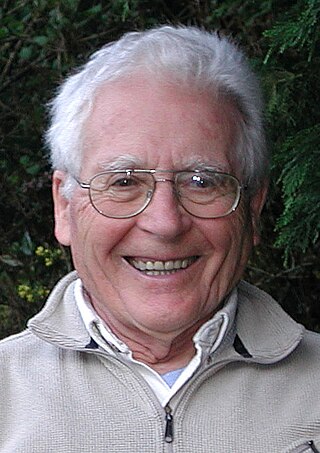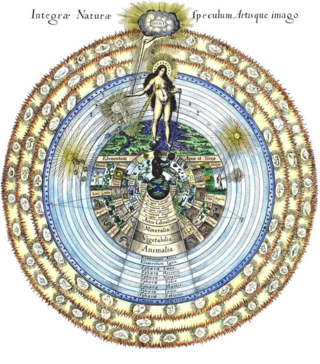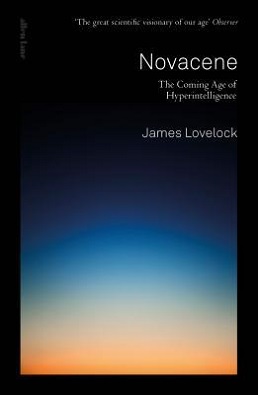Gaia philosophy is a broadly inclusive term for relating concepts about, humanity as an effect of the life of this planet.

James Ephraim Lovelock was an English independent scientist, environmentalist and futurist. He is best known for proposing the Gaia hypothesis, which postulates that the Earth functions as a self-regulating system.
Skepticism, also spelled scepticism in British English, is a questioning attitude or doubt toward knowledge claims that are seen as mere belief or dogma. For example, if a person is skeptical about claims made by their government about an ongoing war then the person doubts that these claims are accurate. In such cases, skeptics normally recommend not disbelief but suspension of belief, i.e. maintaining a neutral attitude that neither affirms nor denies the claim. This attitude is often motivated by the impression that the available evidence is insufficient to support the claim. Formally, skepticism is a topic of interest in philosophy, particularly epistemology.

Lynn Margulis was an American evolutionary biologist, and was the primary modern proponent for the significance of symbiosis in evolution. In particular, Margulis transformed and fundamentally framed current understanding of the evolution of cells with nuclei by proposing it to have been the result of symbiotic mergers of bacteria. Margulis was also the co-developer of the Gaia hypothesis with the British chemist James Lovelock, proposing that the Earth functions as a single self-regulating system, and was the principal defender and promulgator of the five kingdom classification of Robert Whittaker.
The Earth immune system is a controversial proposal, claimed to be a consequence of the Gaia hypothesis. The Gaia hypothesis holds that the entire earth may be considered a single organism (Gaia). As a self-maintaining organism, Earth would have an immune system of some sort in order to maintain its health.

In progress

A superorganism, or supraorganism, is a group of synergetically-interacting organisms of the same species. A community of synergetically-interacting organisms of different species is called a holobiont.

The Gaia hypothesis, also known as the Gaia theory, Gaia paradigm, or the Gaia principle, proposes that living organisms interact with their inorganic surroundings on Earth to form a synergistic and self-regulating complex system that helps to maintain and perpetuate the conditions for life on the planet.

Mary Beatrice Midgley was a British philosopher. A senior lecturer in philosophy at Newcastle University, she was known for her work on science, ethics and animal rights. She wrote her first book, Beast and Man (1978), when she was in her late fifties, and went on to write over 15 more, including Animals and Why They Matter (1983), Wickedness (1984), The Ethical Primate (1994), Evolution as a Religion (1985), and Science as Salvation (1992). She was awarded honorary doctorates by Durham and Newcastle universities. Her autobiography, The Owl of Minerva, was published in 2005.
Spiritual ecology is an emerging field in religion, conservation, and academia that proposes that there is a spiritual facet to all issues related to conservation, environmentalism, and earth stewardship. Proponents of spiritual ecology assert a need for contemporary nature conservation work to include spiritual elements and for contemporary religion and spirituality to include awareness of and engagement in ecological issues.

The concept of the anima mundi (Latin), world soul, or soul of the world posits an intrinsic connection between all living beings, suggesting that the world is animated by a soul much like the human body. Rooted in ancient Greek and Roman philosophy, the idea holds that the world soul infuses the cosmos with life and intelligence. This notion has been influential across various systems of thought, including Stoicism, Gnosticism, Neoplatonism, and Hermeticism, shaping metaphysical and cosmological frameworks throughout history.

Religious naturalism is a framework for religious orientation in which a naturalist worldview is used to respond to types of questions and aspirations that are parts of many religions. It has been described as "a perspective that finds religious meaning in the natural world."

Positivism is a philosophical school that holds that all genuine knowledge is either true by definition or positive – meaning a posteriori facts derived by reason and logic from sensory experience. Other ways of knowing, such as intuition, introspection, or religious faith, are rejected or considered meaningless.
This glossary of philosophy is a list of definitions of terms and concepts relevant to philosophy and related disciplines, including logic, ethics, and theology.

The global brain is a neuroscience-inspired and futurological vision of the planetary information and communications technology network that interconnects all humans and their technological artifacts. As this network stores ever more information, takes over ever more functions of coordination and communication from traditional organizations, and becomes increasingly intelligent, it increasingly plays the role of a brain for the planet Earth. In the philosophy of mind, global brain finds an analog in Averroes's theory of the unity of the intellect.

Living systems are life forms treated as a system. They are said to be open self-organizing and said to interact with their environment. These systems are maintained by flows of information, energy and matter. Multiple theories of living systems have been proposed. Such theories attempt to map general principles for how all living systems work.
A philosophical theory or philosophical position is a view that attempts to explain or account for a particular problem in philosophy. The use of the term "theory" is a statement of colloquial English and not a technical term. While any sort of thesis or opinion may be termed a position, in analytic philosophy it is thought best to reserve the word "theory" for systematic, comprehensive attempts to solve problems.
Bron Raymond Taylor is an American scholar and conservationist. He is professor of religion and nature at the University of Florida and has also been an affiliated scholar with the Center for Environment and Development at the University of Oslo. Taylor works principally in the areas of religion and ecology, environmental ethics and environmental philosophy. He is also a prominent historian and ethnographer of environmentalism and especially radical environmentalist movements, surfing culture and nature-based spiritualities. Taylor is also editor-in-chief of the Encyclopedia of Religion and Nature and subsequently founded the International Society for the Study of Religion, Nature and Culture, serving as its president from 2006 to 2009. He also founded the society's affiliated Journal for the Study of Religion, Nature and Culture, serving as its editor since 2007.

Novacene: The Coming Age of Hyperintelligence is a 2019 non-fiction book by scientist and environmentalist James Lovelock. It has been published by Penguin Books/Allen Lane in the UK, and republished by the MIT Press. The book was co-authored by journalist Bryan Appleyard. It predicts that a benevolent eco-friendly artificial superintelligence will someday become the dominant lifeform on the planet and argues humanity is on the brink of a new era: the Novacene.

On Gaia: A Critical Investigation of the Relationship between Life and Earth is a 2013 book by Earth system scientist Toby Tyrrell, which critically examines the Gaia hypothesis, originally proposed by James Lovelock in the 1970s. The Gaia hypothesis suggests that life on Earth actively contributes to maintaining the planet's habitability through complex interactions between living organisms and their environment. Tyrrell's book argues against the credibility of this hypothesis, drawing on evidence from a wide range of scientific disciplines including climate science, oceanography, atmospheric science, geology, ecology, and evolutionary biology. Through a detailed analysis of the interactions between life and Earth, Tyrrell concludes that the biologically-mediated feedback mechanisms proposed by the Gaia hypothesis are not the main reason for Earth's past environmental stability and do not ensure protection against poor human stewardship of the planet.













